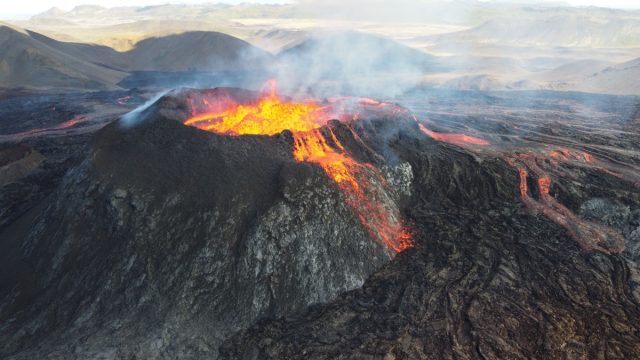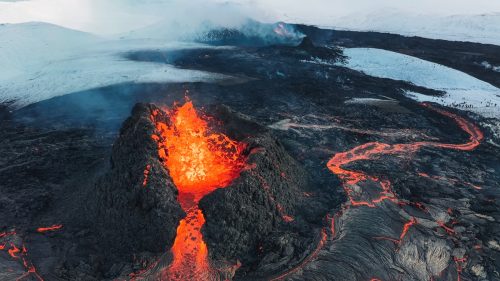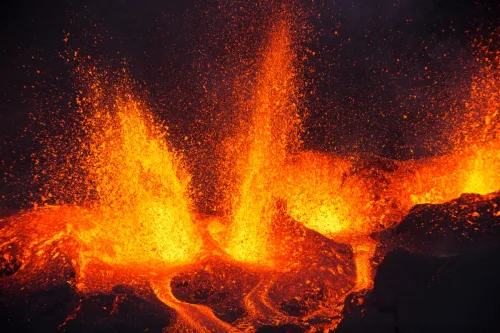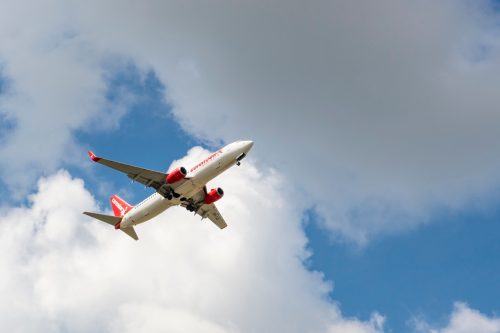46 Volcanoes Are Erupting Right Now—What That Means for Us

The thought of any volcanic eruption is a bit unsettling—but thankfully, that’s not something that likely crosses your mind on a daily basis. Recently, however, there’s been somewhat constant chatter about volcanoes, which has many nerves rattled. According to the U.S Geological Survey (USGS), between 50 and 60 volcanoes erupt each year, averaging about one per week. Right now, there are 46 volcanoes erupting, with experts citing reports of even more volcanic activity. Read on to find out what that means for us.
RELATED: One of America’s “Very High Threat” Volcanoes Keeps Quaking—Could It Erupt Any Day Now?
Several countries are contending with volcanic activity.

According to data published by the Smithsonian National Museum of Natural History Global Volcanism Program, as of Oct. 11, there were 46 ongoing eruptions across the world—and per a list of new volcanic activity published last week, three more volcanoes could soon cause trouble.
As first reported by Newsweek, new additions to the Weekly Volcanic Activity Report (WVAR) include an underwater volcano off the coast of Iwo Jima (Ioto), Japan; Klyuchevskoy, a stratovolcano (one with a more cone-like shape) in Central Kamchatka, Russia; and a volcano on the Reykjanes Peninsula in Iceland.
Currently, residents in Iceland are bracing for an impending eruption following hundreds of small earthquakes, Time reported. A small fishing town, Grindavík, has already been evacuated due to resultant cracks in the earth that cut across roadways and under buildings.
These three volcanoes are in addition to 16 other erupting volcanoes labeled as “continuing” on the WVAR for the week of Nov. 1 through Nov. 7. The website also notes that the WVAR doesn’t include all eruptions—only volcanic activity that meet certain criteria, including the release of a volcanic ash advisory, observed significant change in volcanic activity, a raised or lowered alert level at the volcano, or a verifiable news report of new activity or change in activity.
Per the Smithsonian, the WVAR averages about 16 volcanoes per week and provides information about newer eruptions. The complete list of current eruptions is updated every six to eight weeks.
RELATED: Italian Supervolcano Is Sparking Concern and Evacuation Plans.
People are worried about all of these reports.

On social media, people have expressed concern following increased activity in Mexico at the Popocatépetl volcano, as well as in Italy, with the eruption of the Mount Etna volcano on the island of Sicily and increased seismic activity at the Campi Flegrei, an eight-mile-wide caldera in Naples.
“Is it just me, or has the entire world’s volcanoes become active? Now—New island appears after the eruption of an underwater #volcano in Japan,” a user posted on X on Nov. 12. The post referenced the emergence of a new island following the eruption of the undersea volcano in Japan.
“Iceland, Mt Etna and Japan. No, it’s not just you!” another user wrote in response.
Another added, “This is kind of what I’m wondering as well. Trying not to be paranoid but it is doing me a concern. lol.”
RELATED: Why Popular U.S. Vacation Spots Are Seeing More Volcanic Activity Suddenly.
Experts addressed fears about eruptions.

While nearly 50 ongoing volcanic eruptions may seem abnormal and worrisome, according to experts, it’s not anything to be overly concerned about.
“PSA: Volcanoes are erupting all the time all over the world. That’s normal. That’s what Earth’s volcanos do: they erupt,” volcanologist and science journalist Robin George Andrews, PhD, volcanologist and science journalist, wrote on X. “And there’s enough of them that some will always be erupting at the same time. You know what *would* be weird? If absolutely no volcanoes were erupting.”
Speaking with Newsweek, Ben Andrews, PhD, research geologist and Global Volcanism Program Director, added that the number of erupting volcanoes isn’t out of the ordinary, either.
“The number of volcanoes erupting right now is normal,” he told the outlet. “There are currently 46 ongoing eruptions, and over the past 30 years there have generally been about 40-50 eruptions happening at any given time. Since 1991, there have been between 56 and 88 eruptions each year; 67 eruptions have happened thus far this year, and there were 85 in 2022.”
Another X user pointed out that social media trends could be sparking fears as well. “There are always volcanoes erupting in the world. Nothing new. Only social media attention is new,” they wrote.
There could still be some consequences.

While those living near these volcanoes should take care with their personal safety, if you’re not in close proximity, you can relax a bit. But if you’re going on a trip anytime soon, keep tabs on your flight schedule, as volcanic eruptions have been known to disrupt travel plans, The New York Times reported.
The newspaper cited the 2010 eruption of the Eyjafjallajokull volcano in Iceland, which flooded the air with a cloud of ash and forced airlines to cancel thousands of flights.
This is a possibility with the current situation in Iceland, but the country’s tourism department isn’t sure how significant an eruption would be.
“At this moment it is not possible to conclude what effects a possible volcanic eruption on the Reykjanes Peninsula might have on flight traffic to and from Iceland,” the tourism website reads. “It is not possible to say when an eruption might unfold, or accurately pinpoint where it might surface. The location and the size of the eruption will determine what affects it will have on flight traffic.”
According to the NYT, however, past eruptions in the Reykjanes Peninsula area haven’t affected flights in and out of Iceland.
RELATED: For more up-to-date information, sign up for our daily newsletter.